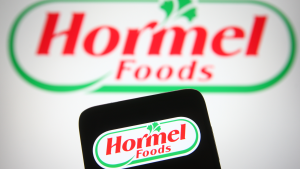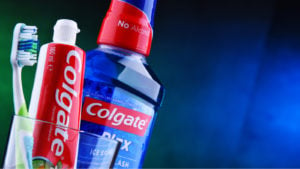Income investors should focus on stocks that pay solid yields, but also those that have sustainable payouts and strong business models. The safest dividend stocks can raise their dividends each year, even during recessions.
The following three dividend stocks have low dividend payout ratios and recession-proof business models, meaning their dividends are well-covered even during a recession.
Hormel Foods (HRL)

Hormel Foods (NYSE:HRL) was founded in 1891 in Minnesota. Since that time, the company has grown into a giant in the food products industry with over $12 billion in annual revenue. Hormel has kept its core competency as a processor of meat products for well over a hundred years but has also grown into other business lines through acquisitions. The company sells its products in 80 countries worldwide, and its brands include Skippy, Spam, Applegate, Justin’s and more than 30 others.
Hormel posted fourth-quarter and full-year earnings on Nov. 29, 2023, and results were weaker than expected on both the top and bottom lines. Adjusted earnings per share (EPS) came to 42 cents, missing estimates fairly widely by 3 cents, or about 7%. Revenue also fell 2.6% year-over-year to $3.2 billion, missing estimates by $70 million, or roughly 2%. Adjusted operating income came to $313 million, or 9.8% of revenue. Adjusted before-tax operating earnings came to $289 million. Cash flow from operations came to $319 million.
Along with quarterly earnings, Hormel boosted its dividend by 2.7% to a new payout of $1.13 per share annually. This marks its 58th consecutive annual dividend increase.
Hormel’s main competitive advantage is its roughly 40 products that are either No. 1 or No. 2 in their category. Hormel has brands that are proven, and that leadership position is difficult for competitors to supplant. In addition, Hormel has a global network of distributors that few food companies can rival.
Despite the challenges seen this year, Hormel has a long track record of steady growth. It is a member of the Dividend Kings. Relatively consistent results have come from a steady stream of acquisitions along with organic growth. This has afforded Hormel the ability to consistently raise its dividend as well.
Hormel’s payout ratio is just under 70% of earnings. Furthermore, we expect that it will remain this way for the foreseeable future. HRL stock currently yields 3.5%.
Colgate-Palmolive (CL)

Colgate-Palmolive (NYSE:CL) has been in existence for more than 200 years, having been founded in 1806. It operates in many consumer staples markets, including Oral Care, Personal Care, Home Care, and more recently, Pet Nutrition. These segments afford the company nearly $19 billion in annual revenue.
Colgate-Palmolive posted third-quarter earnings on Oct. 27, 2023, and results were better than expected on both revenue and profits. Adjusted EPS came to 86 cents, which was 6 cents ahead of estimates. Revenue was $4.92 billion, which was 10.3% higher year-over-year.
It also beat expectations by $100 million. Net sales were up 9% on an organic basis, with five out of the company’s six divisions posting gains, as well as all four of its product categories.
Gross margin came to 58.5% of revenue, up 130 basis points year-over-year. Gross margin was impacted negatively by higher private label sales, which was from the previously disclosed acquisitions of pet food businesses. Net cash provided by operations was $2.6 billion for the first nine months, which is 39% higher year-over-year.
Guidance for the year was raised as well, with net sales growth now expected to be 6% to 8%, including a minor negative impact from forex translation. Organic sales growth is now expected to be 7% to 8%, up from the previous 5% to 7%.
The dividend should rise at about the rate of earnings growth, potentially hitting $2.23 per share in 2028. Colgate-Palmolive’s dividend-increase streak should remain intact for years to come as its payout is still reasonable, and earnings hold up well during recessions.
The payout ratio is 60% of earnings, indicating a safe payout, and it is likely Colgate-Palmolive will produce many more years of dividend increases. CL has increased its dividend for over 60 consecutive years. It is a recession-resistant company given the staple nature of the products it sells. Its competitive advantages are the dominant brands it owns and its strong market share, which provides the ability to raise prices. CL stock yields 2.5%.
Deere & Co (DE)

Deere & Co (NYSE:DE) is the largest manufacturer of farm equipment in the world. The company also makes equipment used in construction, forestry and turf care, produces engines and provides financial solutions to its customers.
In late November, Deere reported financial results for the fourth quarter of fiscal 2023. Sales slipped 1% over the prior year’s quarter as the benefit from strong demand for farm and construction equipment was offset by a decrease in the sales of the Production and Precision Ag and Small Ag and Turf segments. Deere grew its EPS 11%, from $7.44 to $8.26, and beat the analysts’ consensus by 85 cents.
Many factors could fuel growth for Deere. For instance, acquisitions such as the takeover of Wirtgen Group in late 2017 could spur growth. In addition, long-term global economic growth and share buybacks could add to the growth thesis. The company reduced its share count by 25% between 2008 and 2016, so it could ramp up buybacks in the future.
Finally, Deere will benefit from the long-term trend of the rising global population and the increasing demand for food. Deere is the largest player in the agricultural machinery manufacturing industry. This means that it is hard for new competitors to steal market share from Deere, especially since it is difficult to replicate the company’s global sales and dealership network. Deere has also been growing its presence in the higher-growth construction machinery market, both organically as well as via acquisitions.
With a 2024 expected dividend payout ratio below 20%, Deere’s dividend payout is highly secure with lots of room for dividend growth.
On the date of publication, Bob Ciura did not hold (either directly or indirectly) any positions in the securities mentioned in this article. The opinions expressed in this article are those of the writer, subject to the InvestorPlace.com Publishing Guidelines.

